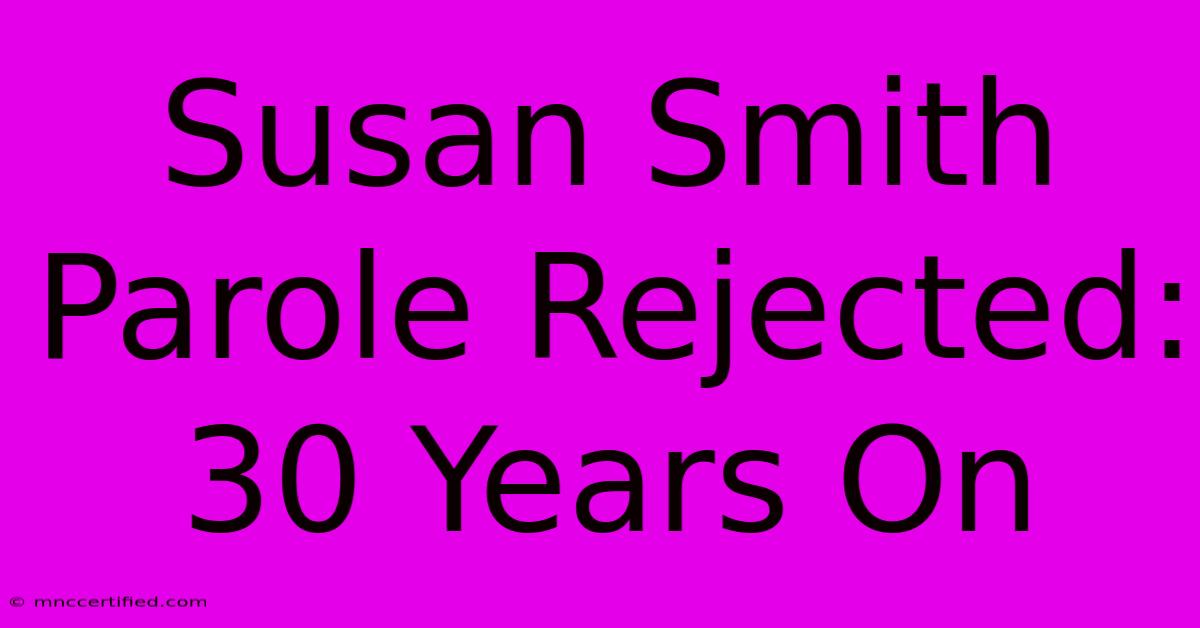Susan Smith Parole Rejected: 30 Years On

Table of Contents
Susan Smith Parole Rejected: 30 Years On - A Nation Still Reeling
Thirty years after the tragic drowning of her two young sons, Susan Smith remains a chilling reminder of the depths of human depravity. Her parole hearing, recently rejected, has reignited the national conversation surrounding her heinous crime and the ongoing debate about justice, forgiveness, and the possibility of rehabilitation. This article delves into the details of the case, the reasons behind the parole denial, and the enduring impact of this devastating event.
The Case That Shocked America
In 1994, Susan Smith, a young mother from Union, South Carolina, reported her car stolen with her two sons, 3-year-old Michael and 14-month-old Alex, strapped inside. The ensuing search captivated the nation, a desperate hunt for a missing family that turned into a nightmare. Nine days later, Smith confessed to intentionally rolling her car into a lake, drowning her children. Her motive? A failed relationship with a wealthy man who didn't want children.
This confession shattered the American psyche. The image of a mother callously ending the lives of her own innocent children became a potent symbol of unimaginable cruelty. The case spurred intense media coverage, fueling public outrage and igniting debates about child abuse, domestic violence, and the death penalty.
The Trial and Sentencing
Smith’s trial was highly publicized, with intense media scrutiny and public fascination. She was convicted of two counts of murder and sentenced to life in prison without the possibility of parole – a sentence that, at the time, carried a significant weight and was considered appropriately severe given the nature of her crime.
The Recent Parole Hearing and its Aftermath
Smith's recent parole hearing, held after serving 30 years of her sentence, brought the case back into the public eye. The hearing focused on various factors, including her behavior in prison, remorse, and the potential risk she might pose to society if released. While Smith's legal team presented arguments for her release, citing her good behavior and participation in prison programs, the parole board ultimately denied her request.
Reasons for Parole Denial
The official reasons for denying parole remain largely undisclosed, adhering to the confidentiality often surrounding such proceedings. However, the overwhelming public sentiment, fueled by the horrific nature of the crime and the lasting trauma inflicted upon the victims' families, likely played a significant role. The enduring impact of her actions, the lack of demonstrable, profound remorse, and the perceived danger she might still present to society were probably key considerations for the board's decision.
The Enduring Legacy of the Susan Smith Case
The Susan Smith case continues to resonate deeply within the American consciousness. It serves as a stark reminder of the unpredictable nature of human behavior and the devastating consequences of violence against children. It's a case study in the complexities of the justice system, grappling with questions of punishment, rehabilitation, and the societal response to extreme acts of cruelty.
The Ongoing Debate
The rejection of Smith's parole highlights the enduring debate surrounding life sentences without parole and the possibility of rehabilitation for individuals who commit heinous crimes. While some believe in the principle of rehabilitation and the possibility of change, others maintain that certain crimes are so unforgivable that life imprisonment without parole remains the only just punishment. This ongoing discussion is critical in shaping our understanding of justice and its application.
Conclusion: A Case That Will Not Be Forgotten
Susan Smith's parole rejection marks a significant moment, but it is unlikely to be the final chapter in this tragic saga. The case continues to serve as a cautionary tale, a constant reminder of the fragility of life and the enduring impact of unspeakable acts of violence. The public’s response—a mix of outrage, grief, and continuing interest—underscores the lasting psychological scar left by this crime and the importance of addressing its underlying causes, like domestic violence and child abuse prevention. The legacy of Susan Smith will continue to fuel discussions about justice, forgiveness, and the complexities of the human psyche for years to come. The question remains: can true rehabilitation ever be achieved, and if so, how do we determine when it has been accomplished in cases as horrific as this one?

Thank you for visiting our website wich cover about Susan Smith Parole Rejected: 30 Years On. We hope the information provided has been useful to you. Feel free to contact us if you have any questions or need further assistance. See you next time and dont miss to bookmark.
Featured Posts
-
La Insurance New Braunfels Texas
Nov 21, 2024
-
Jelly Roll And Brooks And Dunn Win Cmas 2024
Nov 21, 2024
-
Mc Bryde Sings Kristoffersons Help Me Make It
Nov 21, 2024
-
Rhinoplasty Covered By Insurance
Nov 21, 2024
-
Olympus Insurance Company Rating
Nov 21, 2024